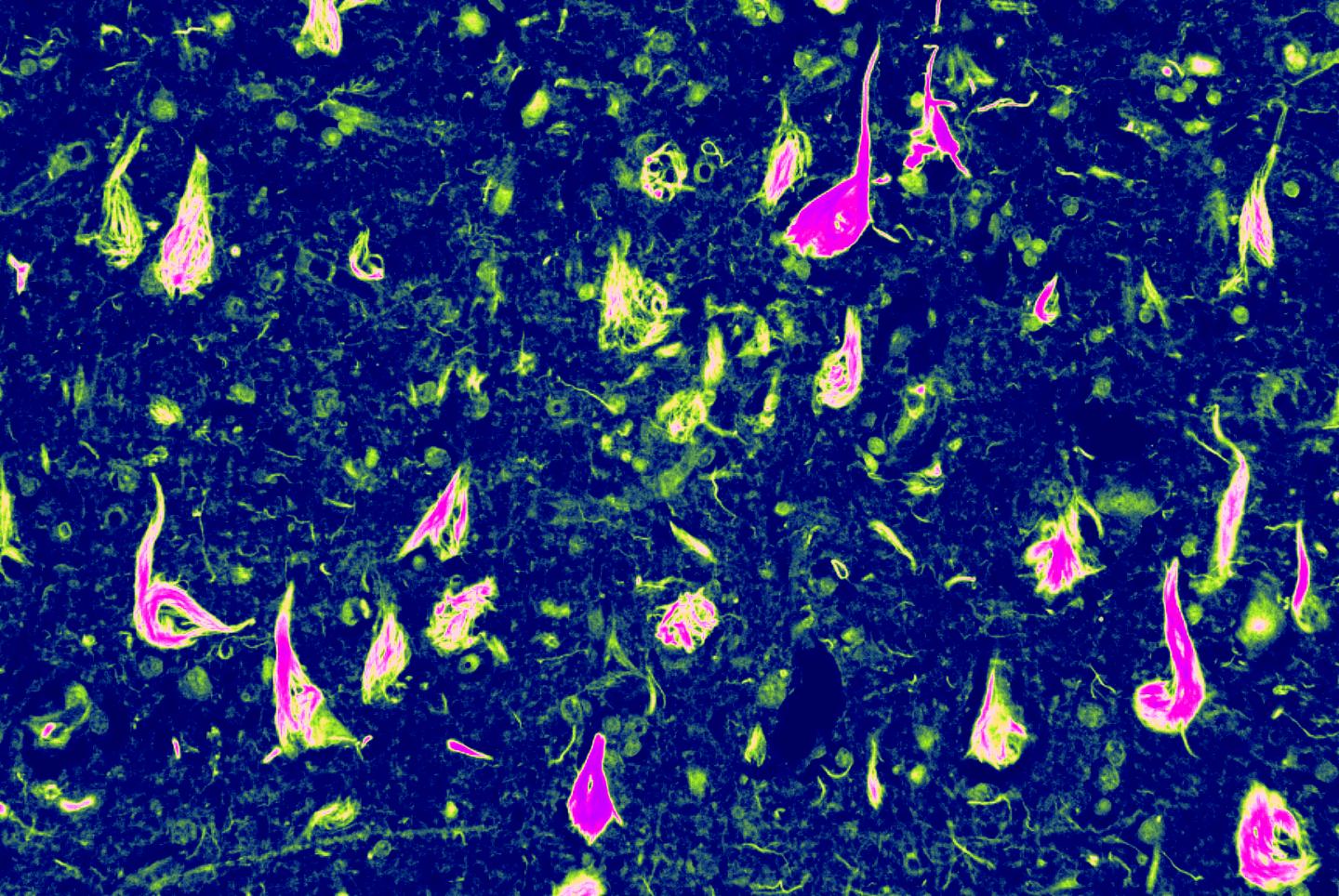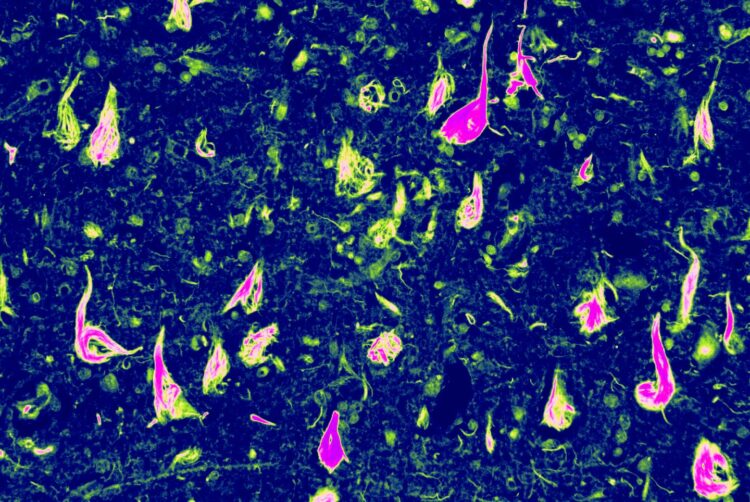
Credit: Edward Lee
PHILADELPHIA — A new, rare genetic form of dementia has been discovered by a team of Penn Medicine researchers. This discovery also sheds light on a new pathway that leads to protein build up in the brain — which causes this newly discovered disease, as well as related neurodegenerative diseases like Alzheimer’s Disease — that could be targeted for new therapies. The study was published today in Science.
Alzheimer’s disease (AD) is a neurodegenerative disease characterized by a buildup of proteins, called tau proteins, in certain parts of the brain. Following an examination of human brain tissue samples from a deceased donor with an unknown neurodegenerative disease, researchers discovered a novel mutation in the Valosin-containing protein (VCP) gene in the brain, a buildup of tau proteins in areas that were degenerating, and neurons with empty holes in them, called vacuoles. The team named the newly discovered disease Vacuolar Tauopathy (VT)–a neurodegenerative disease now characterized by the accumulation of neuronal vacuoles and tau protein aggregates.
“Within a cell, you have proteins coming together, and you need a process to also be able to pull them apart, because otherwise everything kind of gets gummed up and doesn’t work. VCP is often involved in those cases where it finds proteins in an aggregate and pulls them apart,” Edward Lee, MD, PhD, an assistant professor of Pathology and Laboratory Medicine in the Perelman School of Medicine at the University of Pennsylvania. “We think that the mutation impairs the proteins’ normal ability to break aggregates apart.”
The researchers noted that the tau protein they observed building up looked very similar to the tau protein aggregates seen in Alzheimer’s disease. With these similarities, they aimed to uncover how this VCP mutation is causing this new disease — to aid in finding treatments for this disease and others. Rare genetic causes of diseases can very often offer insight into more prevalent ones.
The researchers first examined the proteins themselves, in addition to studying cells and an animal model, and found that the tau protein buildup is, in fact, due to the VCP mutation.
“What we found in this study is a pattern we’ve never seen before, together with a mutation that’s never been described before,” Lee said. “Given that this mutation inhibits VCP activity, that suggest the converse might be true — that if you’re able to boost VCP activity, that could help break up the protein aggregates. And if that’s true, we may be able to break up tau aggregates not only for this extremely rare disease, but for Alzheimer’s disease and other diseases associated with tau protein aggregation.”
###
Lee led this work with first author, Nabil Darwich, MD/PhD student in the Neuroscience Graduate Group at Penn.
These findings describe a new biologic function of VCP, define a new mechanism that leads to tau protein aggregation, and suggest a new possible therapeutic target for the treatment of AD.
Other Penn co-authors include Jessica M. Phan, Boram Kim, EunRan Suh, Lakshmi Changolkar, Aivi T. Nguyen, Caroline M. O’Rourke, Zhuohao He, Sílvia Porta, Garrett S. Gibbons, Kelvin C. Luk, Murray Grossman, Lauren Massimo, David J. Irwin, Corey T. McMillan, Ilya M. Nasrallah, Geoffrey K. Aguirre, and Vivianna M. Van Deerlin. Other co-authors include John D. Papatriantafyllou, Sokratis G. Papageorgiou, and Camilo Toro.
This study was supported by grants from the NIH, the BrightFocus Foundation, and a Clinical Scientist Development Award from the Doris Duke Charitable Foundation. The NIH Undiagnosed Diseases Program is funded by the Common Fund, Office of the Director, NIH.
Penn Medicine is one of the world’s leading academic medical centers, dedicated to the related missions of medical education, biomedical research, and excellence in patient care. Penn Medicine consists of the Raymond and Ruth Perelman School of Medicine at the University of Pennsylvania (founded in 1765 as the nation’s first medical school) and the University of Pennsylvania Health System, which together form a $8.6 billion enterprise.
The Perelman School of Medicine has been ranked among the top medical schools in the United States for more than 20 years, according to U.S. News & World Report’s survey of research-oriented medical schools. The School is consistently among the nation’s top recipients of funding from the National Institutes of Health, with $494 million awarded in the 2019 fiscal year.
The University of Pennsylvania Health System’s patient care facilities include: the Hospital of the University of Pennsylvania and Penn Presbyterian Medical Center–which are recognized as one of the nation’s top “Honor Roll” hospitals by U.S. News & World Report–Chester County Hospital; Lancaster General Health; Penn Medicine Princeton Health; and Pennsylvania Hospital, the nation’s first hospital, founded in 1751. Additional facilities and enterprises include Good Shepherd Penn Partners, Penn Medicine at Home, Lancaster Behavioral Health Hospital, and Princeton House Behavioral Health, among others.
Penn Medicine is powered by a talented and dedicated workforce of more than 43,900 people. The organization also has alliances with top community health systems across both Southeastern Pennsylvania and Southern New Jersey, creating more options for patients no matter where they live.
Penn Medicine is committed to improving lives and health through a variety of community-based programs and activities. In fiscal year 2019, Penn Medicine provided more than $583 million to benefit our community.
Media Contact
Melissa Moody
[email protected]
Original Source
https:/
Related Journal Article
http://dx.





